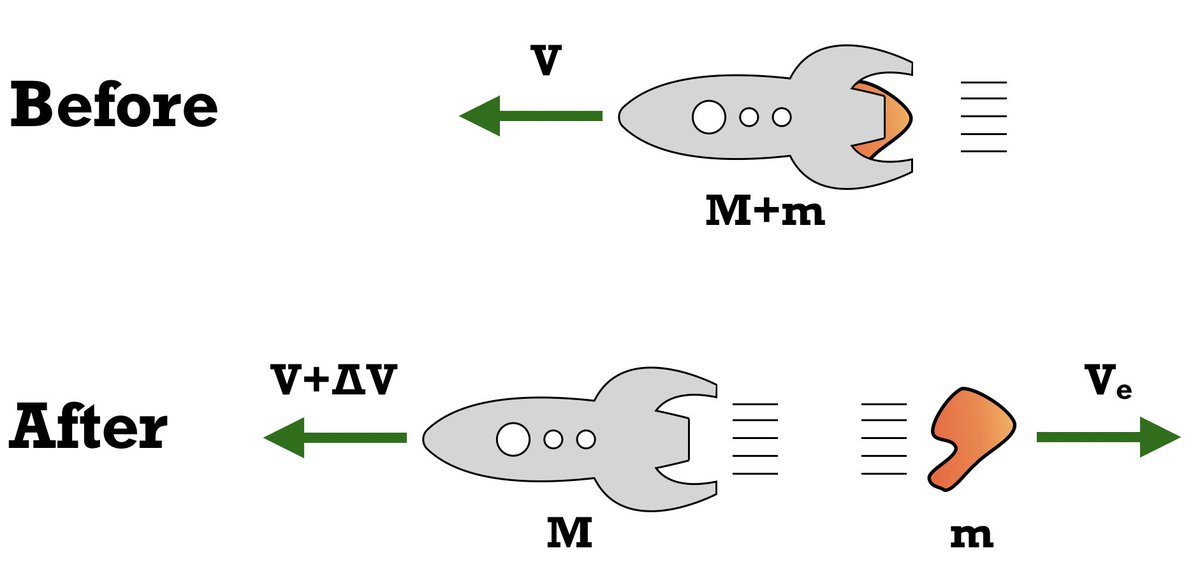For a long time, I thought this was a great (i.e., fun) idea. It's obviously a lazy way to reduce pollution on Earth and does nothing to promote the sustainability we desperately need. But let's do some physics anyway, eh? https://twitter.com/VU_Physics/status/1295862959814643713
If you've watched any space movies (I'm currently thinking of The Martian), you're probably aware that there are LOTS of ways to get from point A to point B in space. It depends on how fast you can go and which planets are in the way.
How fast can you go? How about a little bit of rocket physics? Suppose we have a rocket of mass M carrying fuel of mass m, moving left w/speed V. Conservation of momentum says that if we throw the exhaust to the right at speed Ve, the rocket's speed to the left will increase.
But how much? Well, it's going to depend on how fast you can throw the exhaust and how much there is. But importantly, it depends on the exhaust mass RELATIVE TO the rocket mass. Consider an example. Suppose the rocket has mass 1000 kg and is moving at 1000 m/s.
If you throw 1 kg of exhaust to the right, it's only 1/1000th of the total mass; you need its speed to be 1000V in order to double the rocket's speed. You can see pretty quickly that the fuel needs to be a significant fraction of the rocket mass in order to let the rocket rocket!
This brings us to the rocket equation. One way to express it is in terms of that mass fraction Mf, the fraction of the total initial mass ejected. The important point is that as you demand a bigger speed boost ΔV, the required fuel grows exponentially. Fuel is heavy!
Basically, the faster you want to go, the more fuel you need, which means you need more fuel to launch that fuel, etc. So, going fast is tricky. Just ask @NASASun and the Parker Solar Probe!
The other thing you need to consider is other planets: think "slingshots" and "gravity assists." If you time it right, you might be able to use the gravity of Venus to speed you up or slow you down, or nudge you in a different direction.
For ballpark estimating purposes, let's pretend that no other planets exist. Let's just figure out roughly how much energy we'd need to get from Earth to the Sun.
The fun part about this problem is that the problem isn't really how to go fast; it's how to stop! The Earth whips around the Sun once a year, some 930 billion meters every 31.5 million seconds. It's about 29.8 km/s or 67,000 mph.
Now suppose that we were to launch a rocket opposite the direction of Earth's motion around the sun with exactly the same speed. The escape speed from Earth is ~11 m/s, so it's more than enough to get off the surface. What would happen?
Well ignoring all those pesky other planets, once we get far enough away from the Earth, the Sun's gravity should take over. We can think about this with inner Lagrange point L1, where an object can stay, with the gravitational forces from the Earth+Sun precisely balanced.
For the Earth-Sun system, that point is 99.7% of the distance from the Sun to the Earth. It's basically how close you have to get to Earth for Earth gravity to take over the Sun's gravity. Moral? The Sun is a lot bigger than Earth!
So to within the sort of precision we're working with here, once we launch our trash into space at 67,000 mph, it's going to find itself caught in the sun's gravity. And we know what happens then!!!
So let's say we've got 1000 kg of trash (a slight underestimate). A bit of googling suggests that current rocket engines have effective exhaust speeds of a few thousand m/s; I propose ΔV/Ve is ~6. Looking back at our rocket equation, we can calculate that Mf=1-0.9975.
99.75% of the mass we need to accelerate our payload to the right speed is fuel! Our trash represents a mere 0.25% of the total mass. 1000 kg of stuff destined for the sun means 402,000 kg of fuel to burn.
Our payload and exhaust alone end up with about 5.5 trillion joules of kinetic energy in Earth's reference frame. That's roughly the yearly energy usage of 15-16 people in the United State. These same people will produce on average not 1000 kg but *11,300* kg of trash in a year.
Needless to say, this is not a good use of energy.
But it's also a good lesson. There aren't any magical solutions to a greener planet. We don't need to throw our trash into the sun: we need to produce less trash, and we need to reuse and recycle as much of our waste as possible!

 Read on Twitter
Read on Twitter



